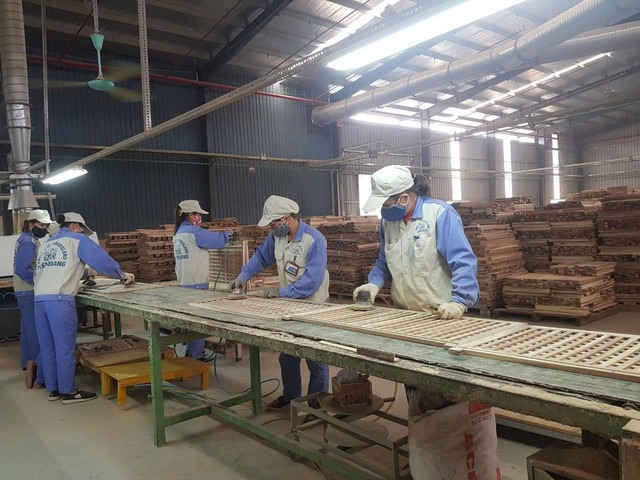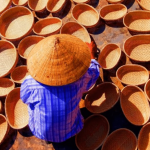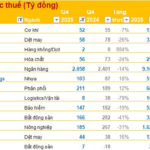The wood industry is one of the sectors that has seen a positive rebound in export activities. According to the Ministry of Agriculture and Rural Development, in the first seven months of 2024, the export of wood and forest products is estimated to reach $9.36 billion, accounting for 61.5% of the annual plan and a 20.5% increase compared to the same period last year.
Small orders, low profits
Mr. Pham Anh Duong, Director of Hai Duong MDF Construction and Production JSC, shared that up to this point, the company’s orders have increased by approximately 50% compared to the previous year. The company has also received orders through the first quarter of 2025. However, according to Mr. Nguyen Liem, Chairman of the Binh Duong Wood Processing Association, due to the still-low global demand and buyers’ concerns about inventory, the orders for businesses in the entire industry have been divided into smaller lots, with shorter delivery times, and especially lower prices.
In the textile industry, orders started to recover in April 2024. VitaJean has already received orders for the full year, an increase of 20%-30% compared to last year. According to the company’s Chairman, Mr. Pham Van Viet, global political tensions have caused buyers to turn to Vietnam; however, large-volume orders have significantly decreased. “Previously, the company received orders of up to 50,000 products per code, but now it’s only 3,000–5,000 products per code. Smaller orders, increased costs, and unchanged prices have led to reduced profits,” Mr. Viet said.
According to Mr. Vu Duc Giang, Chairman of the Vietnam Textile and Apparel Association, the domestic textile industry has certain advantages as Bangladesh faces challenges. To turn this opportunity into a strength, textile businesses need to focus on applying science and technology and developing human resources in conjunction with risk control and green transformation…
 Wood exports are experiencing a positive recovery as many businesses see a significant increase in orders compared to the previous year. Photo: THUY LINH |
From another perspective, Mr. Pham Xuan Hong, Chairman of the Board of Saigon 3 Garment Company and Chairman of the Ho Chi Minh City Textile Embroidery Association, stated that the political instability in Bangladesh has had a certain impact on Vietnam’s textile industry, but not significantly. This is because Bangladesh’s textile industry focuses on the medium and low segments with cheap prices, while Vietnam is in a higher segment. “Although orders have increased, the textile industry is not out of difficulty when customers offer very low prices, and some businesses lack labor,” said Mr. Hong.
A representative of the Vietnam Textile and Apparel Corporation predicted that from now until the end of the year, demand in the main consuming markets would not improve. Moreover, the plan to cut interest rates in the major importing markets is still unclear, while the competing exporting country is expected to devalue its currency by about 15%-20% to regain market share, putting pressure on Vietnam in terms of unit prices, especially since export prices in the past two years have already been low. In addition, there are a series of other increasing pressures, such as sea freight rates, wages, electricity prices, and bank interest rates. Given this situation, businesses should focus on producing technically challenging products, small orders but with high added value, instead of focusing on common and cheap products.
Enhanced Credit Support
Ms. Do Thi Thuy Huong, a member of the Executive Committee of the Vietnam Electronics Business Association, said that the current solution for businesses is to approach “suitable” orders.
Currently, there are many orders that do not require high technology, such as large orders for small refrigerators to be placed in hotels in Sweden and Norway. “However, the readiness of businesses to accept these orders is very low. It seems that businesses are still ‘dreaming’ of orders that are ‘too far’ or ‘too high’ and missing out on nearby opportunities,” said Ms. Huong.
Ms. Huong also pointed out that many businesses choose to process for big brands and are not autonomous in the supply chain and design stages. “Only when businesses design, master technology, and develop multiple products with their brands can they reap high profits,” Ms. Huong noted.
Mr. Nguyen Liem predicted that the market would determine the survival of the factory, and the products would determine the productivity and value of the business. Therefore, businesses need to promote market development and improve governance to maximize the capacity and potential of the factory.
Meanwhile, VitaJean’s Chairman, Mr. Pham Van Viet, proposed that the state support businesses in accessing preferential loans to renew technology, machinery, and equipment. “Technology only needs to lag by two years to fall behind the world. If we know how to apply technology, we can sell online to Europe from Vietnam,” Mr. Viet shared.
From the management agency’s perspective, the Ministry of Industry and Trade believes that there is a need for a flexible and effective exchange rate and interest rate management policy. Specifically, adjusting the exchange rate flexibly and appropriately in the context of low-interest rates in Europe and Japan, along with closely following the moves of the US Federal Reserve (Fed), is essential to ensure the competitiveness of Vietnamese goods in the international market.
Given the increase in orders and positive signs of export recovery, the Ministry of Industry and Trade has proposed that the Government assign the State Bank to provide financial support and credit incentives for businesses to help them fulfill signed contracts and expand exports, especially in the textile, footwear, agriculture, forestry, and aquatic product sectors…
|
Market Diversification Mr. Do Ngoc Hung, Commercial Counselor and Head of the Vietnam Trade Office in the US, said that in the context of the US still considering Vietnam a non-market economy, businesses need to be very well prepared when exporting to this market. At the same time, they must always be ready to face trade remedy lawsuits by US domestic producers at any time. According to the Head of the Vietnam Trade Office in the US, Vietnam has signed many free trade agreements with major trading partners. Businesses can take advantage of this opportunity to diversify export and import markets for raw materials, avoiding regulations related to US trade, in particular, and World Trade Organization (WTO) member countries, in general. T.LINH |
THUY LINH – THANH NHAN
The most extensive bribery case ever in Thanh Hoa: Numerous suspects prosecuted for “Giving and Receiving Bribes”
The Provincial Security Investigation Agency (PSIA) of Thanh Hoa province announced on January 31st that it has made the decision to initiate a prosecution against 23 individuals in connection with the offenses of “Accepting bribes” and “Giving bribes” as stipulated in Article 354(3) and Article 364(2) of the Criminal Code.
Accelerating disbursement of the 120 trillion VND credit package for social housing
Deputy Prime Minister Trần Hồng Hà has recently issued directives regarding the implementation of the 120,000 billion VND credit package for investors and buyers of social housing, workers’ housing, and projects for the renovation and construction of apartment buildings.
Vietnam’s Irresistible ‘Specialty’ That China Desperately Wants to Revive: Highly Popular from the US to Asia, Bringing in Millions of Dollars
Vietnam is one of the largest exporting countries in the world, along with China and the Philippines.



















